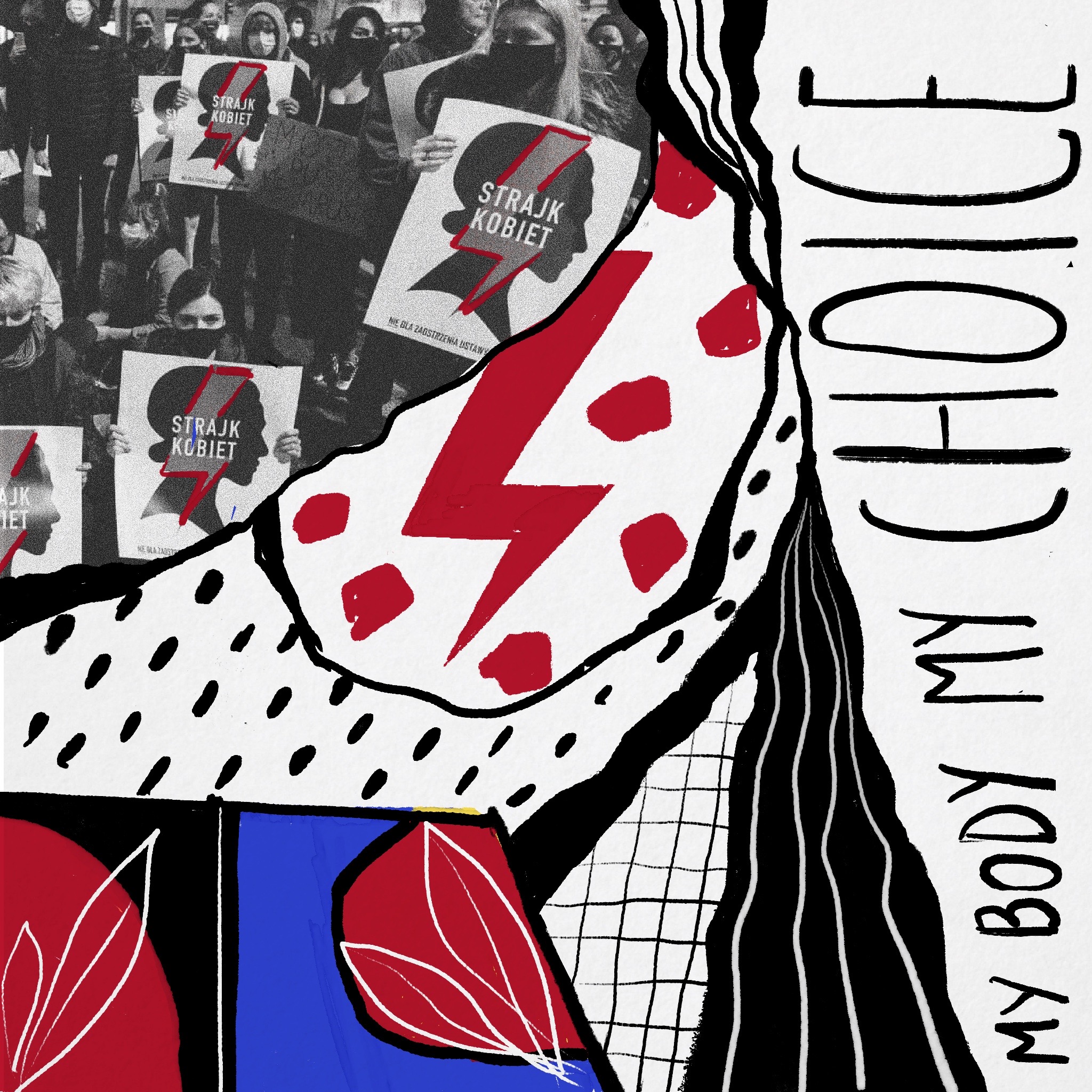Thunders versus troops
Warsaw, 2022. Everywhere around the signs of hand-made rebellion: paper-cut fists and red flashes of lightning on the windows, stickers on buses, furious graffiti on the blocks’ walls. In the capital of Poland, one can have the impression that female resistance against the almost total ban on abortion has taken over the whole public space. But the street tale of women has an opposite pole: the thousands of rightist billboards, sponsored by state-backed organisations, either accuse Germany of war crimes or make calls to “save the lives of the unborn”. The official signs of the nationalistic ideology counterpose the unofficial signs of individuals’ anger.
Overwhelmingly Catholic Poland is a country of great moral disagreement: liberal vs conservative, Western vs Eastern, left vs right. The social division is also about gender: statistically, young women support the left in shoals, and young men lean towards the radical right. This ideological war has already cost lives: in recent months, three young women have died in hospitals because doctors postponed their abortions, which eventually led to complications and then death. Since 2016 the Polish women have been shouting on the streets “We don’t want to die”. Now they must handle the horrible reality: in the name of the state ideology, some of them are dying.
The so-called compromise
Under the Communist regime, access to abortion was common and the Church didn’t go out of its way to oppose it. Abortion was part of life, period.
Still, the system was widely regarded as ineffective and imposed by the Russians. Therefore from the 1980s millions of Poles joined Solidarity, the opposition movement, and the Polish church actively supported all actions of dissidents to overthrow the regime. After 1989 politicians decided that the Church deserves a special reward for its merits, so in 1993 the so-called “abortion compromise” was introduced: from now on, abortion was allowed only if the pregnancy was threatening the mother’s life, if the pregnancy was the result of rape, or if the fetus was seriously ill. Despite the fact that women protested, and 100,000 signatures were collected against the new law, the abortion compromise came into force.
None of the political parties tried to change it. Yet none of the parties tried to interfere with underground abortions: the drugs causing miscarriages were commonly available, there were ads in newspapers to „induce menstruation”, and abortion tourism was a common practice for women who could afford to go to Germany, Czech Republic, Slovakia or Austria. Everyone knew the methods, price lists, the names of doctors, drugs and foreign clinics. Women helped each other and shared their knowledge. In Poland, brimful with Christian love of life, almost every woman knew a woman who had an abortion.
The coffin benefit
Everything changed when the radical right-wing Law and Justice (PiS) party came to power, and its leader Jarosław Kaczyński announced in 2016 that the ceasefire would be broken.
“We will strive to ensure that women give birth even to a severely deformed child,” he announced. “Even if a child is sentenced to death, it has to be delivered, so that it could be baptized and buried with a name.”
What sounded like a horror story has become a reality. The authorities, highly praising the agony of terminally ill children and the suffering of their parents, invested in prenatal hospices and introduced a special “coffin benefit” intended to sweeten the parents’ grief that their child was born only to die. After all, according to the Catholic religion, nothing enriches us more than suffering. Suddenly, PiS was full of advocates for the lives of children with Down syndrome, and the accusations arose that the law was a form of eugenic abortion. Women were to be deprived of the right to choose how much they could sacrifice for their sick unborn child.
“If I am dead, I cannot deliver”
The authorities declared war on women and the women took to the streets in the hundreds of thousands. The protests against planned changes in the law covered not only large cities but also small towns where people had never been politically involved. Old ladies were blocking pedestrian crossings, young people were pouring red paint on churches. “This is war,” screamed people on the streets, “We will never agree to this hell for women”. The Black Protests turned into week-long carnivals of women’s anger and frustration. “Why is the life of the fetus more important than my own?”, asked women. “I don’t want to be a living coffin”, “Being dead, I cannot deliver”, screamed the inscriptions on the posters. Everyone on the streets was simply singing “Fuck PiS”.
And yet PiS did not take even one step back. In 2020 the Constitutional Court consisting of humble lambs announced that “the dignity of a fertilized egg should be assessed higher than the dignity of a pregnant woman.” This ridiculous sentence meant that the abortion due to incurable defects of the fetus was considered unconstitutional in Poland, and therefore illegal. Hundreds of thousands went back to the streets, but the verdict was upheld anyway.
“No one more”
What women feared the most – that they would die as a result of the new law – eventually happened. In a small town in southern Poland, thirty-year-old Izabela, the mother of a nine-year-old girl, died of sepsis because the doctors, fearing the prosecutor’s reaction, delayed the abortion of the damaged fetus. The sentence of the Constitutional Court makes it obligatory for doctors to withhold abortion until the fetus is dead or the woman’s life is in danger. But in such risky situations, even one hour of delay might induce sepsis and later – death.
Polish doctors admit that they are afraid to make decisions that protect a woman’s life because they might be prosecuted for not doing enough to save the fetus.
As it turned out, another woman, thirty-three-year-old Anna, had died a few months before due to due to delayed abortion and sepsis. In January 2022, a mother of three children, Agnieszka, 37, who was pregnant with twins, died due to “medical errors”. The proceedings of the prosecutor’s office will establish why the woman died and whether her death was again the result of the doctors’ indolence.
“No one more,” shout the women in the streets. And yet another one died. And another one will die.
Landscape after the battle
The PiS leader commented in an interview: “There are advertisements in the press that every mediocre person understands, and they can arrange an abortion abroad, cheaper or more expensive.” It doesn’t matter how many abortions there are. What matters is that the ideology prevails.
But the victory of PiS is elusive. The never-ending discussion on abortion has reshaped public discourse. Today, one in three Poles support abortion on demand, and two in three demand the liberalisation of the law. Moreover, 73 per cent of young people demand the legalization of abortion. For the first time since 1989, young people have taken such an open stand against the Church. Today a third of young people declare themselves non-believers.
Perhaps PiS won the battle, but they did not win the war. The party managed to antagonize society and induce fear among young women. The change of law and the pandemic have caused a dramatic drop in the number of births. Thanks to the protests, every Polish woman knows about Abortion Without Borders, the organisation that helps women organise fast and cheap abortions abroad. Last year, 34,000 women took advantage of this opportunity. Just like the party leader advised.











